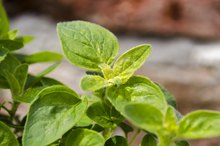Tulsi Tea and Pregnancy
Pregnancy is not a time to take chances with your diet. Tulsi tea, also known as holy basil, has been consumed for thousands of years in the Indian culture, but there's not enough information about how it might affect your pregnancy. Consult your doctor first before sipping.
About Tulsi Tea
The tulsi plant is a member of the basil family, and its tea has a minty sweet taste. In Ayurvedic medicine, it's recommended that you consume the tea daily to promote good health, prevent disease and help manage stress. It's also recommended as a treatment for a number of conditions, some of which you may experience during pregnancy, such as vomiting, indigestion and back pain. It's important to note, however, that evidence to support use of tulsi tea for these ailments is based on animal and test tube studies. Clinical trials need to be conducted to confirm these benefits.
- The tulsi plant is a member of the basil family, and its tea has a minty sweet taste.
- it's also recommended as a treatment for a number of conditions, some of which you may experience during pregnancy, such as vomiting, indigestion and back pain.
Tulsi Tea and Pregnancy
Decaf Black Tea & Pregnancy
Learn More
Currently, there is not enough information as to the safety or efficacy of drinking tulsi tea during pregnancy. Drugs.com reports that there is conflicting information about how the tea may affect your baby. Some toxicity studies on rats have found that high doses of the tea impacts health of the rat fetus, while other studies have found no ill effects. Stay safe and don't drink tulsi tea until you've checked with your doctor.
- Currently, there is not enough information as to the safety or efficacy of drinking tulsi tea during pregnancy.
Healthier Tea Options
Instead of tulsi, consider adding a tea that's known to be safe to drink during pregnancy. The American Pregnancy Association reports that red raspberry tea is a safe tea for pregnant women, and drinking it may help decrease labor time. It's also a source of iron. Peppermint tea is considered a safe tea for pregnancy as well and may help relieve nausea, says the association.
- Instead of tulsi, consider adding a tea that's known to be safe to drink during pregnancy.
- The American Pregnancy Association reports that red raspberry tea is a safe tea for pregnant women, and drinking it may help decrease labor time.
Caution During Pregancy
Can You Drink Too Much Lemongrass Tea?
Learn More
While diet is an important aspect of your pregnancy, what you don't eat, or drink, is as important as what you do. The reason it's so important to be mindful of your food and drink choices is because of how it might affect your baby. Avoiding certain foods may reduce risk of birth defects. Although tulsi tea has been consumed for thousands of years, being cautious about drinking it during your pregnancy may be better for your baby.
- While diet is an important aspect of your pregnancy, what you don't eat, or drink, is as important as what you do.
- The reason it's so important to be mindful of your food and drink choices is because of how it might affect your baby.
Related Articles
References
- BMC Genomics: Unravelling the Genome of Holy Basil: an “Incomparable” “Elixir of Life” of Traditional Indian Medicine
- Drugs.com: Holy Basil
- Journal of Ayurveda and Integrative Medicine: Tulsi - Ocimum Sanctum: A Herb for All Reasons
- Davidson's Tea: What Is Tulsi?
- American Pregnancy Association: Herbal Tea and Pregnancy
- KidsHealth: Pregnancy Precaution
- Pharmacognosy Review: Ocimum Sanctum Linn. A Reservoir Plant for Therapeutic Applications: An Overview
- Agrawal P, Rai V, Singh RB. Randomized placebo-controlled, single blind trial of holy basil leaves in patients with noninsulin-dependent diabetes mellitus. Int J Clin Pharmacol Ther. 1996;34(9):406-9. pmid: 8880292.
- Bhattacharyya D, Sur TK, Jana U, Debnath PK. Controlled programmed trial of Ocimum sanctum leaf on generalized anxiety disorders. Nepal Medical College Journal. 2008;10(3):176-9. pmid: 19253862
- Gupta S, Mediratta PK, Singh S, Sharma KK, Shukla R. Antidiabetic, antihypercholesterolaemic and antioxidant effect of Ocimum sanctum (Linn) seed oil. Indian Journal of Experimental Biology. 2006;44(4):300-4. pmid: 16629372
- Jamshidi N, Cohen MM. The Clinical Efficacy and Safety of Tulsi in Humans: A Systematic Review of the Literature. Evid Based Complement Alternat Med. 2017;2017:9217567. doi: 10.1155/2017/9217567.
- Saini A, Sharma S, Chhibber S. Induction of resistance to respiratory tract infection with Klebsiella pneumoniae in mice fed on a diet supplemented with tulsi (Ocimum sanctum) and clove (Syzgium aromaticum) oils. Journal of Microbiology, Immunology, and Infection. 2009;42(2):107-13. pmid: 19597641
- Sampath S, Mahapatra SC, Padhi MM, Sharma R, Talwar A. Holy basil (Ocimum sanctum Linn.) leaf extract enhances specific cognitive parameters in healthy adult volunteers: A placebo controlled study. Indian J Physiol Pharmacol. 2015;59(1):69-77. pmid: 26571987
- Sharma MK, Kumar M, Kumar A. Ocimum sanctum aqueous leaf extract provides protection against mercury induced toxicity in Swiss albino mice. Indian Journal of Experimental Biology. 2002;40(9):1079-82. pmid: 12587743
Writer Bio
Jill Corleone is a registered dietitian and health coach who has been writing and lecturing on diet and health for more than 15 years. Her work has been featured on the Huffington Post, Diabetes Self-Management and in the book "Noninvasive Mechanical Ventilation," edited by John R. Bach, M.D. Corleone holds a Bachelor of Science in nutrition.









